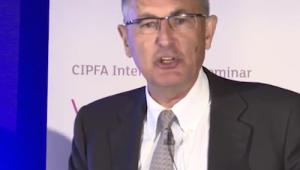Speaking at a public financial management conference in Islamabad, jointly hosted by CIPFA and the Institute of Chartered Accountants of Pakistan, earlier this month, Matheson said finance professionals should use their role as innovators, business partners, stewards and strategists in order to adapt to tougher conditions and improve both accountability and sustainable service performance.
“Following the sovereign debt crisis around the world, public services now face change and prolonged periods of fiscal retrenchment,” he said.
“Given the unprecedented times we are living in, finance functions must adapt their ways of working, priorities, cultures and behaviours for a new climate.”
Matheson said finance functions should offer new insights into organisational strategies, business models, opportunities for collaboration and savings to aid innovation.
They should be comparing themselves with other organisations to draw out best practice and looking to peer networks to see if there are lessons to be learnt, he added.
As business partners, finance functions should be seeking to add value. He said they can do this by managing demand, seeking productivity improvements, financing the future, assessing commercial opportunities and taking the lead on value for money and resource allocation.
“The finance function has a crucial role to play in maintaining effective oversight of the organisation’s business activities,” he continued, speaking to their part as a steward of taxpayers’ money.
He said responsibilities of the steward include ensuring that there is effective scrutiny, that risk is cost-effectively mitigated and that public money is transparently reported and accounted for.
Finally, as strategists, the finance function must look at its own scope for cost reduction through systems change.
Sharing services, such as back-office functions, amalgamating functions or joining with other agencies in the public sector can save on costs, he said, while technology can bring the benefits of speed, accuracy, automated controls and audit trail.
Effective finance functions will be on the lookout for management economies from new IT developments, he added.
“Financial constraints offer a real opportunity to focus and prioritise on what really matters,” he stated, encouraging financial managers to “drive that transformation and encourage more radical thinking”.
The conference also heard from Gillian Fawcett, head of the governments faculty at CIPFA. She addressed delegates on the importance of PFM in service delivery. She highlighted some high profile failures, such as the city of Detroit’s 2013 bankruptcy, which arose from weaknesses in public financial management.
She told delegates that reforms would fail without a whole-systems approach, which supports effective PFM across regions and sectors. “The whole is more than the sum of the parts,” she said.
Fawcett also stressed that accrual-based information was essential to improved public spending control, as was strong leadership and a focus on the short, medium and long term.













